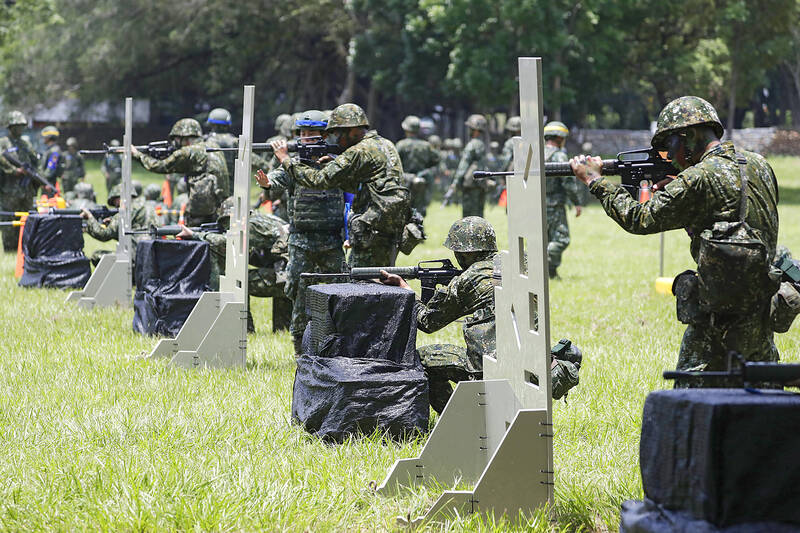The Ministry of National Defense earlier this week said that it has proposed pay rises for volunteer enlistees amid reports of a fourfold increase in military personnel opting out of their contracts early.
The ministry’s comments came following a report in the Chinese-language United Daily News that 1,565 voluntary military personnel left the armed forces last year by invoking an opt-out clause introduced in 2009 and paying a financial penalty, compared with 401 in 2020.
With the departures, the number of serving volunteer military personnel in Taiwan stood at 152,885 in June last year, the lowest since 2018, the ministry said.

Photo: Chiang Ying-ying, AP
Major General Kao Chih-hsiung (高志雄) from the ministry’s Department of Resource Planning said that the ministry had proposed a salary raise for voluntary military personnel in the form of differential payments.
Similarly, differential payments have also been proposed for members of combat troops and non-combat personnel whose work entails technical skills, Kao said.
The proposed differential payments are pending review by the Cabinet and the amounts would be announced after the proposals are approved, he added.
Meanwhile, the recruitment rate of volunteer military personnel has fallen to 78.4 percent of the ministry’s target, from 89 percent in 2020, ministry statistics showed.
Combat troops are usually hit hardest by insufficient recruitment rates across all military units and are likely to post an even lower rate of less than 70 percent, posing a threat to the nation’s standing combat troops, said Chieh Chung (揭仲), a research fellow at the Association of Strategic Foresight.
Asked whether the ministry would work toward automating and modernizing the armed forces with technology to make up for the perceived shortfall in recruitment, ministry spokesperson Major General Sun Li-fang (孫立方) said it is not only a goal that the ministry is working toward, but an international trend.
The ministry is devising plans for automated deployments, including those relating to the military’s strike capabilities, and necessary adjustments to the outfitting of troops in light of new military equipment the country has purchased, Sun added.

Taiwan yesterday condemned the recent increase in Chinese coast guard-escorted fishing vessels operating illegally in waters around the Pratas Islands (Dongsha Islands, 東沙群島) in the South China Sea. Unusually large groupings of Chinese fishing vessels began to appear around the islands on Feb. 15, when at least six motherships and 29 smaller boats were sighted, the Coast Guard Administration (CGA) said in a news release. While CGA vessels were dispatched to expel the Chinese boats, Chinese coast guard ships trespassed into Taiwan’s restricted waters and unsuccessfully attempted to interfere, the CGA said. Due to the provocation, the CGA initiated an operation to increase

CHANGING LANDSCAPE: Many of the part-time programs for educators were no longer needed, as many teachers obtain a graduate degree before joining the workforce, experts said Taiwanese universities this year canceled 86 programs, Ministry of Education data showed, with educators attributing the closures to the nation’s low birthrate as well as shifting trends. Fifty-three of the shuttered programs were part-time postgraduate degree programs, about 62 percent of the total, the most in the past five years, the data showed. National Taiwan Normal University (NTNU) discontinued the most part-time master’s programs, at 16: chemistry, life science, earth science, physics, fine arts, music, special education, health promotion and health education, educational psychology and counseling, education, design, Chinese as a second language, library and information sciences, mechatronics engineering, history, physical education

The Chinese military has boosted its capability to fight at a high tempo using the element of surprise and new technology, the Ministry of National Defense said in the Quadrennial Defense Review (QDR) published on Monday last week. The ministry highlighted Chinese People’s Liberation Army (PLA) developments showing significant changes in Beijing’s strategy for war on Taiwan. The PLA has made significant headway in building capabilities for all-weather, multi-domain intelligence, surveillance, operational control and a joint air-sea blockade against Taiwan’s lines of communication, it said. The PLA has also improved its capabilities in direct amphibious assault operations aimed at seizing strategically important beaches,

‘MALIGN PURPOSE’: Governments around the world conduct espionage operations, but China’s is different, as its ultimate goal is annexation, a think tank head said Taiwan is facing a growing existential threat from its own people spying for China, experts said, as the government seeks to toughen measures to stop Beijing’s infiltration efforts and deter Taiwanese turncoats. While Beijing and Taipei have been spying on each other for years, experts said that espionage posed a bigger threat to Taiwan due to the risk of a Chinese attack. Taiwan’s intelligence agency said China used “diverse channels and tactics” to infiltrate the nation’s military, government agencies and pro-China organizations. The main targets were retired and active members of the military, persuaded by money, blackmail or pro-China ideology to steal